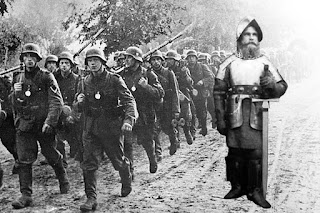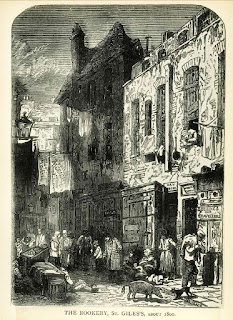By None But Me Can the Tale Be Told: The White Ship Disaster November 25, 1120 and the Victorian Poem that Made it Legendary
“The passengers and crew raised cries of distress, but their mouths were soon stopped by the swelling waves and all perished together.”
- from The Ecclesiastical History of England and Normandy ca. 1140
November 25, 1120
William Adelin, Duke of Normandy and heir to the English throne, the only legitimate son of King Henry I, after a visit to Normandy to pay homage to the French King as a gesture of goodwill on behalf of his father, has just been persuaded by ship’s Captain Thomas FitzStephen to return to England aboard his own personal vessel--the White Ship.
Though King Henry I, Adelin’s father has arranged transport back to England aboard another royal vessel, FitzStephen has persuaded the eighteen year old Adelin and King Henry, that in the interest of historical continuity it would be best for the young heir to the English throne to travel across the channel and back to his homeland aboard his own stately and elegant ship.
FitzStephen’s argument is convincing. He points out the fact that it was his own father, Stephen FitzAdaire who had transported the legendary King William the Conqueror, Adelin’s own grandfather and King Henry’s father, to England, during the Norman Conquest of 1066. FitzStephen says to King Henry I, “My father served yours all his life by sea, and he it was who steered the ship in which your father sailed for the conquest of England. Sire King, I beg you to grant me the same office…I have a vessel called the White Ship, well equipped and manned with fifty skillful mariners.”
So it is agreed by all, that in the interest of projecting historical continuity with the past Norman Kings of England, that young eighteen year old William Adelin, heir to the English throne, will travel across the English Channel and back to his homeland aboard the White Ship.
 |
| William Adelin |
Over three hundred noblemen and women, including most members of the English royal family, set sail from Barfleur in Normandy on that fateful day of November 25, 1120 on what was supposed to be a brief trip home across the English Channel.
All died at sea.
Everyone aboard the White Ship, except for a lowly butcher from the French town of Rouen, is said to have perished when the elegant White Ship struck a rock just off the Normandy coast and sank to the bottom of the ocean.
The year 1120 was centuries before most anyone, especially anyone who was not a member of the vile peasantry (e.g. a butcher) knew how to swim.
British Victorian poet Dante Gabriel Rossetti would immortalize the White Ship Disaster and the butcher from Rouen in a poem he composed in the year 1880. His poem was written in ballad form and entitled simply: The White Ship.
Rossetti's poem opens with this chilling stanza:
By none but me can the tale be told,
The butcher of Rouen, poor Berold.
(Lands are swayed by a King on a throne.)
‘Twas a royal train put forth to sea,
Yet the tale can be told by none but me.
(The Sea hath no King but God alone.)
 |
| Dante Gabriel Rossetti |
Long before Rossetti immortalized the sinking of the White Ship in Victorian British literature, noted twelfth century historian William of Malmesbury first told of the White Ship tragedy in his History of the English Kings, which is thought to have been written in the year 1126, or only a mere 6 or so years after the White Ship with 300+ nobles on board sank to the bottom of the Channel.
Malmesbury writes in his History, that the young Duke of Normandy, William Adelin was beloved by his countrymen and in the flower of his youth. He records how the hopes of all of England were synonymous with the eighteen year old Prince.
He then goes on to say that although his father King Henry I, had already returned to England earlier on the 25th of November 1120 aboard another vessel, “All the young nobility flocked around William of Adelin,” and they left on a second vessel called the White Ship.
Malmesbury insinuates in his History that all of these young nobles, with hormones raging, loved to party and that they all drank copious amounts of alcohol prior to setting sail across the channel.
 |
| William of Malmesbury |
It was reported that two monks who were supposed to make the trip back to England aboard the White Ship were so disgusted by the drinking and debauchery they witnessed aboard the vessel before it embarked, that rather than set sail for home, the monks chose to leave the ship and stay behind in France.
Among others who disembarked, due quite possibly to disgust at the binge drinking going on aboard the White Ship, was the moral and pious Stephen of Blois who himself would later go on to be a future King of England from 1135 to 1154.
The only survivor of the shipwreck, Berold, the butcher from Rouen, would become known to history through the scholarly work of a Benedictine monk named Orderic Vitalis who wrote a thorough and extensive chronicle of the first decades of the 12th century approximately twenty years after the White Ship disaster called the Ecclesiastical History of England and Normandy. Orderic Vitalis simply wrote that, “The crew asked William of Adelin for wine and he supplied it to them in great abundance.”
Rossetti’s poem states:
“The Prince was a lawless shameless youth;
From his father’s loins he sprang without ruth;
Eighteen years til then he had seen,
And the devil’s dues in him were eighteen.
And now he cried, ‘Bring wine from below…’
Berold, the butcher from Rouen, reported some twenty years later that just prior to the White Ship’s departure from the Normandy coast, a group of French priests had offered to bless the vessel, but he stated that the Holy men were laughed at and scorned by the drunken revelers.
Captain Thomas FitzStephen believed that his new state of the art vessel was the best ship that the world had ever seen up to that point, and he believed that the speed of his ship would allow it to overtake King Henry’s vessel which had set sail for England hours earlier.
Oarsmen rowed with all their might, and the sails were fully furled on that fateful night of November 25, 1120.
The crew of the White Ship, either drunk and in their cups or stone cold sober, rowed and sailed as fast and as straight as an arrow that night and smashed right into an enormous rock just off the Normandy coast.
Almost in an instant the ship broke apart and rapidly began to sink to the bottom of the ocean.
Attempting to save the heir to the English throne, at the last possible second, the crew of the ship launched a small wooden boat with William Adelin aboard and started to row back to the French coast, but William, in one last act of chivalric bravery before death, when he realized that one of his half-sisters was still onboard and sinking to the bottom of the sea jumped overboard in an attempt to save her but was quickly swallowed up by the waves.
Captain Thomas FitzStephens was so overwhelmed by the death of Prince William Adelin that he intentionally drowned himself despite the fact that only he, and Berold the butcher from Rouen, were the only two souls aboard the White Ship who are known to have really been able to swim.
Rossetti wrote of the fate of Captain FitzStephen in his poem:
“He clung, “And what of the Prince,” quoth he.
“Lost! Lost!” we cried. He cried, “Woe on me!”
And loosed his hold and sank through the sea!”
It is said that though news of the White Ship disaster reached England only hours after it occurred, no one dared tell King Henry the fate of his son, out of fear of how distraught he might become. It was only after two days, and the King’s incessant questioning about the whereabouts of his eldest son William Adelin, that young servant boy at the King’s court finally broke the news. King Henry was near suicidal and would remain heartbroken over the death of his son for the rest of his life.
“Your son and all his fellowship,
Lie at the Sea’s bed with the White Ship.”
Though Henry I would serve as King of England until his death fifteen years later in 1135 and though he would remarry soon after the White Ship disaster, he never again would produce another male heir to the throne and instead would arrange a marriage between his daughter Matilda and the Duke of Anjou to try and establish some form of royal succession, after the sinking of the White Ship, England would be thrown into a decades long struggle for power.
 |
| King Henry I |
The death of the heir to the English throne, along with a sizable portion of the English nobility plunged the British Isles, and France, into a years-long Civil War that history would come to call simply: The Anarchy.
Rossetti’s famous victorian ballad ends exactly where it began with these chilling lines:
“By none but me can the tale be told,
The butcher of Rouen, poor Berold…”
http://www.rossettiarchive.org/docs/1-1878.tinkerms.rad.html
Visit the above link to read the complete Text of Dante Gabriel Rossetti’s famous poem: The White Ship courtesy of the Dante Gabriel Rossetti archives.





Comments
Post a Comment